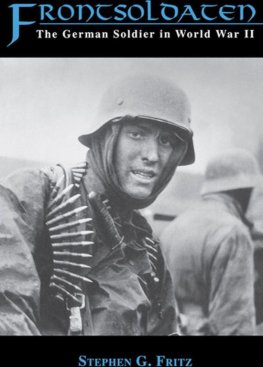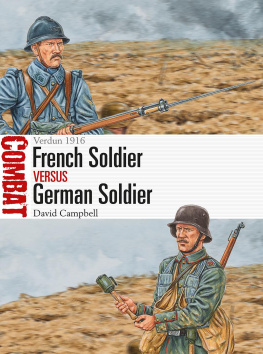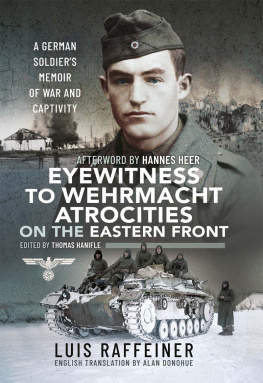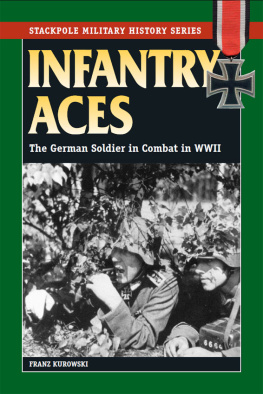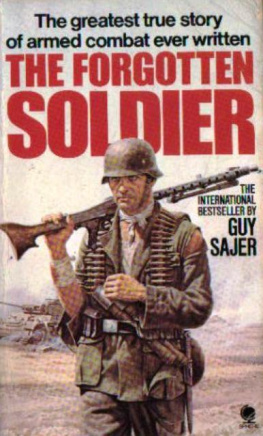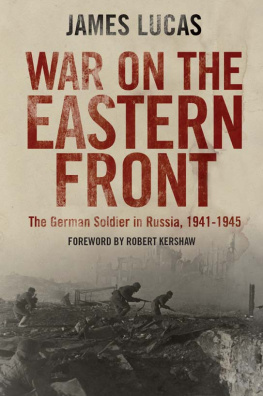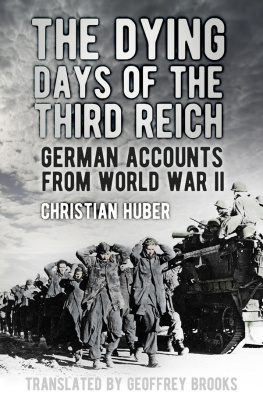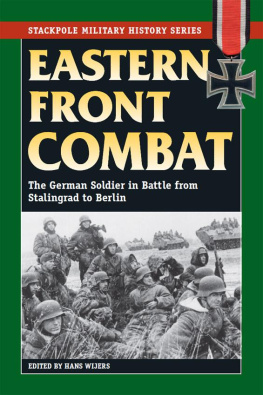FRONTSOLDATEN

FRONTSOLDATEN
The German Soldier
in World War II
Stephen G. Fritz
THE UNIVERSITY PRESS OF KENTUCKY
Publication of this volume was made possible in part by a grant from the National Endowment for the Humanities.
Copyright 1995 by The University Press of Kentucky
Paperback edition 1997
The University Press of Kentucky
Scholarly publisher for the Commonwealth,
serving Bellarmine University, Berea College, Centre College of Kentucky, Eastern
Kentucky University, The Filson Historical Society, Georgetown College, Kentucky
Historical Society, Kentucky State University, Morehead State University, Murray
State University, Northern Kentucky University, Transylvania University, University
of Kentucky, University of Louisville, and Western Kentucky University.
All rights reserved.
Editorial and Sales Offices: The University Press of Kentucky
663 South Limestone Street, Lexington, Kentucky 40508-4008
www.kentuckypress.com
10 09 08 07 06 05 04 10 9 8 7 6 5
Assorted excerpts from The Forgotten Soldier by Guy Sajer, copyright 1967 Editions Robert Laffont. English translation copyright 1971 by Harper & Row Publishers, Inc. Reprinted by permission of HarperCollins Publishers, Inc.
Assorted excerpts from Jahrgang 1916 by Friedrich Grupe, copyright Universitas in der F.A. Herbig Verlagsbuchhandlung GmbH, Munich.
Library of Congress Cataloging-in-Publication Data
Fritz, Stephen G., 1949
Frontsoldaten : the German soldier in World War II / Stephen G. Fritz
p. cm.
Includes bibliographical references and index.
ISBN 0-8131-1920-0 (hardcover : alk. paper)
1. Germany. HeerHistoryWorld War, 19391945. 2. German. HeerMilitary life. 3. SoldiersGermanyHistory20th century. I. Title.
D757.1.F75 1995
940.541343dc20 95-13091
ISBN 0-8131-0943-4 (pbk. : alk. paper)
This book is printed on acid-free recycled paper meeting the requirements of the American National Standard for Permanence in Paper for Printed Library Materials.

Manufactured in the United States of America.

| Member of the Association of
American University Presses |
CONTENTS
PREFACE
T his is not a book about war in the sense that such histories are usually understood; instead, it concerns the nature of men at war. Indeed, war serves as merely the backdrop against which human actions and emotions can be illuminated. As a consequence, I do not take a traditional top-down approach, relying on official documents and assessments of events, but rather approach history from the bottom up, from the perspective of the common fighting man. This approach, of course, has certain limitations, foremost among them the fact that the broad strategic sweep of traditional military history is absent. Nor is there any of the usual conjecture over matters of tactics, leadership, command decisions, or the relative merits of various weapons. Not only have those matters been dealt with elsewhere by other historians, but pursuing them here would negate the entire intent of everyday history. My purpose is to allow average German soldiers to speak, with a minimum of external interference; to hear their words and see the war through their eyes so as to get at the reality of the combat experience as lived by the men in the bunkers and foxholes. It is this sense of immediacy and drama, unfiltered and uncluttered by excessive analysis, that is at the heart of everyday history.
By its very nature, everyday history relies extensively on the comments of average people, which is why I have leaned heavily on quotations from the soldiers themselves. This does not mean, however, that there is no analysis or that the book is simply an edited collection of combat experiences. In reading countless letters and diaries, I analyzed them for personal, social, political, or ideological content, looked for recurring themes, created a systematic framework within each chapter in order to focus the words of the average soldiers, and then commented in a concise, analytical fashion. I could certainly have summarized much of this material in my own words, but then it would have lost the intimacy and impact of the moving stories of little men that are the strength of everyday history.
Because I sought to explore the lives of ordinary men by way of their own perceptions as set down in letters and diaries, I purposely avoided a reliance on official documents and memoranda. For the same reason, because I was concentrating on the average soldier, I chose not to include Waffen-SS units in my study. By the latter stages of the war draftees were being used in some of these units, but by definition the SS were employedand saw themselvesas elite formations apart from the ordinary Landsers. Not that my approach to their everyday history is meant in any way to glorify the average German soldier: as I take pains to point out in the chapters on combat and ideology, these ordinary men, to an extent far greater than previously acknowledged, were ideologically motivated and participated in grievous atrocities for racial and ideological reasons. By the same token, however, I attempt to point out the human fears, anxieties, emotions, insights, joys, sorrows, and tribulations that these men, like other soldiers, experienced from the perspective of the foxhole.
The scope of the book is comprehensive; I have included material from North Africa, Italy, France, and the Balkans, although admittedly these selections are overshadowed by those from Russia. There is, of course, a straightforward reason for this: the overwhelming majority of German combat troops, approximately 80 percent of the total, fought on the eastern front. And since I focus on combat, not on occupation duties, the bulk of the relevant letters and diaries concerned events in Russia.
The translations, unless otherwise noted in the bibliography, are entirely my own, although for difficult or ambiguous phrases I consulted Christa Hungate, professor of German at East Tennessee State University and herself a native German speaker. As far as possible I have attempted to follow the original style of the writer, which is why some excerpts seem particularly articulate and others are more rough-hewn. I have tried as well to convey the spirit of various colloquialisms and slang terms, substituting the closest American equivalent if a literal translation proved impossible. From the American perspective, the Wehrmacht had a bewildering variety of ranks and titles, so in the interest of comprehensibility I have simplified the German ranks into their nearest American equivalents, using the Handbook on German Military Forces of the (then) U.S. War Department as my guide.
In any work of this sort the author incurs a great many obligations, and I am certainly no exception. My curiosity about the everyday history of the Landser was prompted originally by discussions with average Germans during many visits to their country, and in conversations with colleagues and others in the United States, all of whom convinced me that there existed extensive interest in an account of the average German soldier. To all of them, I extend my thanks for steering me to a project that has proved to be immensely stimulating and personally fulfilling. As anyone at a regional state university knows all too well, the demands of teaching mean that time is, in most instances, more important than money. For his efforts at securing release time for me to complete this project, and for the many discussions I have had with him relating to the average soldier in World War II, I owe a debt of gratitude to Ronnie Day, chair of the History Department at East Tennessee State University. Countless conversations with Colin Baxter, another colleague, not only stimulated my imagination but helped to sustain me when my energies were flagging. Tim Jones, a graduate research assistant in the Department of History, proved a valuable sounding board for ideas and engaged me in numerous discussions on military history, theory, and practice. I am also grateful to another department colleague, Margaret Ripley Wolfe, whose generous, thoughtful, propitious, and astute advice was of enormous help to me personally and in the completion of this book. I must thank Christa Hungate not only for her assistance with translations but for graciously allowing me to participate in the ETSU Summer in Germany program, which she created and runs so well, and stress the importance of her friendship to me and my family. Thanks also to the Research Development Council at ETSU, which provided a grant to fund the initial stages of this project. Without the efforts of Beth Hogan, director of the Interlibrary Loan Service at the universitys Sherrod Library, I could not have conducted this research. She tirelessly tracked down innumerable requests for obscure collections of letters and diaries, all in good humor, even claiming that she enjoyed the challenge! To all these people, I offer my thanks. Their efforts in my behalf have provided me a lesson in the meaning of professionalism and collegiality.
Next page




